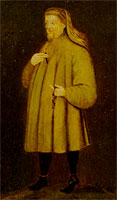A Ballad Of Gentleness Poem by Geoffrey Chaucer
A Ballad Of Gentleness
The firste stock-father of gentleness,
What man desireth gentle for to be,
Must follow his trace, and all his wittes dress,
Virtue to love, and vices for to flee;
For unto virtue longeth dignity,
And not the reverse, safely dare I deem,
All wear he mitre, crown, or diademe.
This firste stock was full of righteousness,
True of his word, sober, pious, and free,
Clean of his ghost, and loved business,
Against the vice of sloth, in honesty;
And, but his heir love virtue as did he,
He is not gentle, though he riche seem,
All wear he mitre, crown, or diademe.
Vice may well be heir to old richess,
But there may no man, as men may well see,
Bequeath his heir his virtuous nobless;
That is appropried to no degree,
But to the first Father in majesty,
Which makes his heire him that doth him queme,
All wear he mitre, crown, or diademe.
He sets up a duality in the first stanza - that of Vice versus Virtue. Stanza I - Kings should profess to follow the lead of Christ, as Virture outlasts worldly pursuits - Vice. Stanza II - While in the name of righteousness, kings can seem to possess Virtue, but in their zealous pursuits, forget to be gentle - Clean of his ghost, and loved business, /Against the vice of sloth, in honesty; -his misguided zealous pursuits cloud true Virtue Stanza III -A King's virtue cannot be 'bequeathed' -only given by a more metaphysical power outside the control of Kinge as in the first Father in majesty - Here there may even be a question of the legitimacy of Divine Right of Kings as Chaucer speaks of Man as the everyman as well as the King - which may be a subtextual political statement which uses God's right to bequeath Virtue - as one given equally to commoners and Kings alike - brilliant use of language!
It would seem that virtue, unlike material riches, is not necessarily passed on. For a poem in Middle English, this is very understandable to Modern English readers; only one word- queme-needed to be looked up, although I decided to confirm two others: 'Bequeath his heir his virtuous nobless*; ' *dignity, greatness 'That is appropried* to no degree, ' *appropriated 'Which makes his heire him that doth him queme*, ' *please
Virtuous are gentle in life who are pious, sober and free but not the rich though wear crown and diadem! Chaucer says about virtue in a gentle style he only knows well!
A wonderful poem of great insight. Well crafted and executed.
This poem was really interesting to me This poem really helped me on my poetry project that I had due in two days! Geoffrey Chaucer you did a nice job on making this poem.
With the muse of humility; for the sake of peace. Great work!
I am agree with Theresa Ciccone..We have to follow the path..must keep the sublimity, vice is swelling on the lap of rich...Geoffrey Chaucer a period in English literature..
This poem has not been translated into any other language yet.
I would like to translate this poem
Excellent ballad! ! ! Well beyond a mere (10) ! ! ! Thad